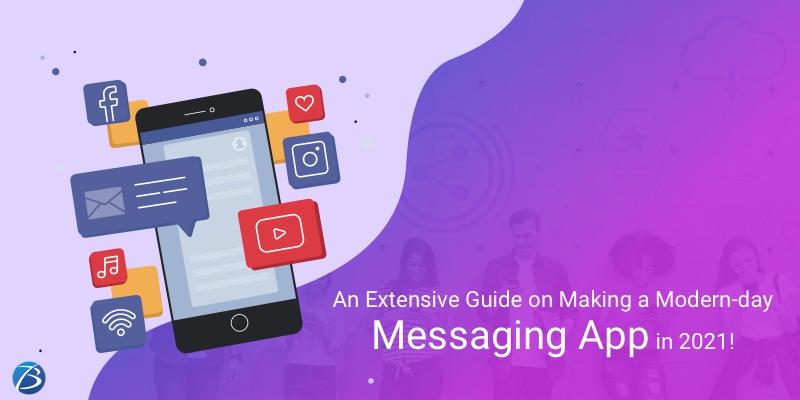An Extensive Guide on Making a Modern-day Messaging App in 2021!


A few years back, sending a single text message to someone used to be charged quite a bit. But since the emergence of new-age messaging apps, chatting with anyone from any corner of the world is now free. So it is no surprise that more than 50% of all smartphone users have one or more messaging apps installed on their phones.
This niche has progressed tremendously in the last decade. With around 2 Billion users on WhatsApp and 1.3 Billion users on Facebook Messenger, it is evident that the popularity of the messaging applications is at its peak. Besides, there are a plethora of other famous apps like Snapchat, WeChat, Telegram, Skype, Viber, etc. that attract millions of users daily. No wonder why start-ups, leading entrepreneurs, and even giant enterprises are competing to create such messaging apps.
So, are you one amongst them? Do you want to create such a captivating messaging application? If yes, this post is for you.
Here we have explained how to create an appealing chat app despite the tough competition in the market. What features are to be embedded in it? What are the challenges involved? We will also shed light on the security best practices and time required to design a full-fledged chat app. So, let’s dive deeper.
Must-have Features of a New-age Messaging Application
It is essential to pick the right feature-set for creating an impactful messaging app. The app should be user-friendly, convenient, and support multitasking. The app should easily provide the users with their chat records. Also, it should be quick in responding to them without long hold times.
Here are some fundamental and powerful features to integrate into such an app. These will make the app appealing to the end-users and provide them a unique chatting experience.
· Authorization of the Users to easily sign-up via phone numbers, social media, email IDs, etc.
· Account creation, profile setting, and ability to customize their profiles on the chat app.
· Instant messaging, message delivery status, group chats, etc.
· Ability to import contacts so that the users can instantly connect with others in their contact list.
· File sharing functionality to exchange files like photos, audio clips, documents, videos, and any other similar content.
· Blocking or reporting unwanted users.
· Push notifications
· Geo-location tracking
· End-to-end encryption
· Synchronization of the app across multiple devices
A Few more Advanced Features to Consider
· Voice and video calling
· Ability to permanently destroy messages, statuses, stories, etc.
· Photo editing feature
· Public channels for users to connect with like-minded users or simply read/view the content they like through these channels
· Entertainment elements like emoticons, gifs, animations, stickers, etc.
· Live-streaming options
· Chatbots- an advanced marketing tool for monetization
· In-app games (though it is a rare feature)
Vital Steps to Architect an Engaging Messaging App
1. Research by doing a thorough analysis of the market, best apps available, current trends, competitors, target audience, etc. Try downloading and using some of the existing apps for in-depth knowledge of messaging apps and also identify the issues in such apps.
2. Decide on the concept of the app, its unique selling proposition, and brainstorm on how the app will befit the target audience. Ensure that you are targeting to fix some issues and gaps that the existing apps from stores have.
3. Identify your business objectives, strategy to create the app, and app monetization techniques.
4. Decide whether to go for messaging app's MVP or a feature-rich model.
5. Choose the platform- whether Android or iOS or both.
6. Pick reliable features to be embedded in the app from the aforesaid list.
7. Identify a proven and experienced messaging app development company and partner with it for your project.
8. Share your objectives with their team and work together to create your dream app with a seamless UX/UI design.
9. Communicate with them from time to time during the chat app development process.
10. Test the app thoroughly before launching it in the market and modify it if required.
11. Implement the planned monetization strategies before the app’s release.
12. Now publish the app on the respective stores.
13. Collect inputs from the users, conduct surveys, etc. to get insights on how well is your app doing in the market.
14. Keep maintaining it and improving it according to the response from the target users.
15. Gradually add new features as you progress.
In the write-up, “What are the Key factors a Startup should Focus on While Developing a Mobile App?” you will get additional insights on this subject.
Potential Challenges in the Messaging App Development Journey
Security Threats: Users want assurance that their conversations are safe and their data does not leak out in any case. This can be challenging to implement for chat app development companies. Please read along as we have discussed in detail the best security practices in the later section.
Server Overload: As the app users start rising, servers may get overloaded, particularly during peak load times. So, the server setup should be capable of handling such loads. Also, all other probable downsides of the server you identify and the remedial measures for those issues should be considered in advance.
Unstable Internet Connections: Internet connectivity can weaken or cut off due to several unpredictable reasons. At such times, some messages sent by users could get lost. So, the apps should be designed to work in an offline mode. When the connection restores, the lost messages should be reproduced.
Issues during App Updates: It must be ensured that while updating the apps with new features and functionalities, existing data shouldn’t be lost owing to architecture configuration or server issues. Ensuring this is especially challenging in real-time chat apps.
Multiple Solutions in One App: Nowadays, users expect a chat app to be much more than a simple app that exchanges texts, calls, multimedia, etc. They expect extra facilities like in-app payments, gaming, capabilities for online marketing of their business, etc.
Security Best Practices to Employ
Messaging apps hold a monumental amount of personal, confidential, and sensitive data of the users, and hence, security must be a vital consideration in the messaging app development process.
Let us have a glance at what some of the renowned apps have done to achieve top-grade security.
WhatsApp developed an end-to-end encryption system by partnering with Open Whisper Systems, a software development group at Signal.org. This system ensures the privacy and security of all the communications happening via the app and even WhatsApp cannot decrypt the chats.
Another app Telegram makes its app secure by utilizing its in-house encryption protocol. Every week or whenever the users complete sending a pre-defined number of messages, cryptographic keys in the app are changed. Even though a single message is intercepted, all other messages remain encrypted.
So, for attaining this kind of security in your chat app, go through the below-given security practices and ensure that they are implemented in the app.
· For any kind of client-server connection, make use of TLS/SSL protocols.
· Utilize powerful authentications like two-factor authentication in the app.
· Implement end-to-end encryption, private and public-key encryption, etc. for the content like text, audio/video calls, etc.
· Ensure that your app complies with data protection and privacy requirements of GDPR i.e. General Data Protection Regulation.
· Back up everything on the app from time to time.
· Use biometrics for the users while accessing the app.
· Never save sensitive data of the users in the database. You can either use hashing algorithms or encode such data.
· For infrastructure deployment, using a private network is one of the best solutions.
· Apply throttling and rate-limiting.
· Users should be able to download media files only when they are active or online. To ensure this, Private File Object storage can be used for each chat with authorization and authentication.
· Make use of an SHA-512 hashing algorithm in the apps.
· Display privacy policies to the users and create additional functionality for them to ensure better data protection.
For gaining some more knowledge on the security of mobile apps, do read the blog- “Actionable Tips for Top-grade Security in Mobile Apps!”.
Timeline Required and Budget Considerations for Creation of a Chat App
Predicting the exact time and pricing of a chat app is not possible until the knowledge of certain factors. This includes the factors like the number of features you decide to embed and their complexity, the number of screens, the platforms you choose for messaging app development, design requirements, the technology stack that you finalize, any peculiarities of the third parties involved, country of development, etc.
Timeline and costing also depend on whether you want to have an MVP model developed first, or a full-fledged app. Based on these factors, the messaging app development services may require a minimum of 2 months and a maximum of 5 months approximately. The pricing could range from $20,000- $50,000; which may somewhat vary from vendor to vendor. Reach out to us to get an estimate for your tailored requirements.
Concluding Thoughts:
The digital world and the end-users always await the arrival of unique messaging apps having compelling concepts, despite the presence of myriad apps in the market. So, entrepreneurs across the globe are experimenting to architect such new-age chat apps. Besides, several existing apps are also being updated with the chat functionality to allure more users as well as gain a competitive edge.
So, are you also wanting to embed this vital feature in your app? Or do you have an amazing concept in mind? Biz4Solutions, an experienced messaging app development company based in Texas, can assist you through the process. Just drop us a line!
To know more about our core technologies, refer to links below:
React Native App Development Company
Other articles and publications:
Articles and publications of other companies:
- +1 (469) 277-0804
- 8305 Tripoli Trl, Frisco, TX 75034, United States
- www.biz4solutions.com/










